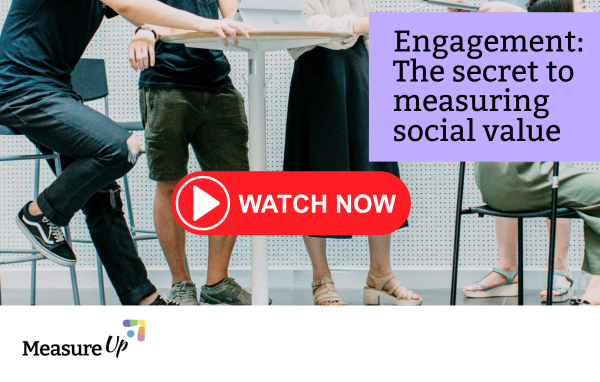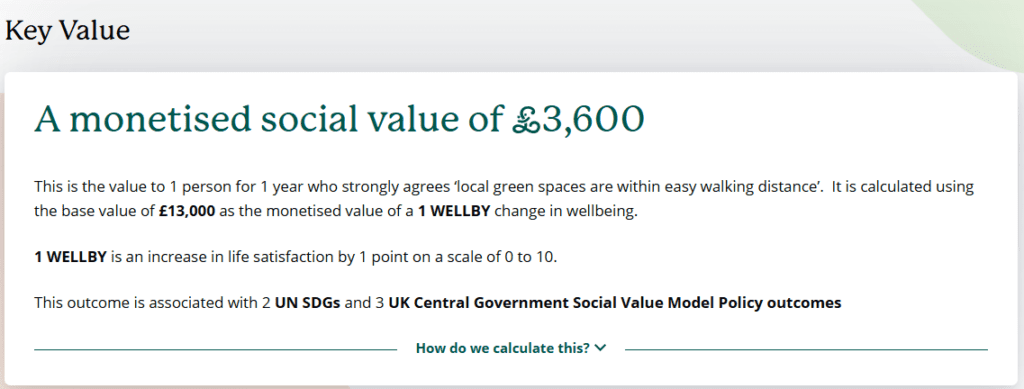[Webinar] Engagement: The Secret Ingredient to Measuring Social Value
Posted: March 11, 2025
At MeasureUp, we believe that if we claim to be improving lives, we must do people the courtesy of asking if we’ve actually done so. That principle was at the heart of our recent webinar, Engagement: The Secret Ingredient to Measuring Social Value, where we explored how meaningful engagement is central to effective social value measurement.
The full recording and presentation deck are now available for you to watch at your convenience.
Watch webinar replay
Why Engagement Matters in Social Value Measurement
Social value measurement is not just about assigning numbers to impact; it’s about listening to, and learning from, the people experiencing change. Engaging with stakeholders—whether beneficiaries, partners, or the wider community—is essential to ensuring that social value measurement is robust, relevant, and rooted in lived experience. As highlighted in the webinar, engagement is fundamental to the Social Value Principles, with ‘involving stakeholders’ as the first principle.

The MeasureUp approach recognises this by structuring measurement into different levels:
- Bronze – Using proxies and estimates to plan and anticipate value.
- Silver – Refining estimates with more specific data.
- Gold – Collecting real-world feedback from the people affected.
- Gold+ – Ensuring value attribution by considering what would have happened anyway.
As you move up each level, the more emphasis and effort are placed on stakeholder engagement, helping you move from estimated impact to verifiable outcomes.
Identifying and Engaging Stakeholders
A key theme of the webinar was the importance of mapping stakeholders effectively. Using the ‘six tests’ method, organisations should consider:
- Who is directly impacted?
- Who is indirectly impacted?
- Who could be impacted in the future?
- Who is needed to make an intervention work?
- Who has expertise on the subject?
- Who has an interest in the initiative?
By identifying these groups early on, organisations can ensure that social value measurement reflects a broad and accurate range of perspectives.
Effective Engagement Techniques
Engagement must be tailored to the audience and the context. The webinar explored three core engagement methods:
- Quantitative – Surveys, polls, and feedback forms provide measurable data.
- Qualitative – Interviews, focus groups, and storytelling capture experiences and insights.
- Participatory – Co-production, citizen juries, and deliberative events empower stakeholders in decision-making.
No single method works for all contexts. The key is using the right approach that enables you to ask the question/s you need to ask, at the right time, ensuring that engagement is inclusive, accessible, and meaningful.
Overcoming Engagement Challenges
One of the biggest barriers to effective engagement is reaching seldom-heard stakeholders. The webinar provided practical advice on:
- Partnering with trusted organisations to facilitate engagement.
- Removing barriers to participation through accessible formats.
- Embedding engagement from the outset rather than as an afterthought.
- Ensuring feedback loops so participants see the impact of their input.
Case Study: Transforming a Manchester Park
One of the standout discussions in the webinar was the case study of a park transformation project in Manchester. The local council aimed to transition the park from a neighbourhood space into a destination park that could attract visitors from further afield while still maintaining its role as a vital space for the local community.
Key Social Value Considerations
- Sustaining Local Benefits: While increasing footfall was a priority, ensuring that the local community still found the park accessible and valuable was equally important.
- Balancing Economic and Social Value: The project explored ways to generate income sustainably, without commercialisation overshadowing community use.
- Stakeholder-Driven Planning: The council engaged deeply with local residents, schools, and community organisations to identify what aspects of the park were already valued and where improvements could be made.
Engagement Methods Used
A range of engagement techniques were employed to capture diverse perspectives:
- Focus Groups and Panels – Residents and community organisations were invited to share their thoughts on the park’s existing strengths and areas for improvement.
- School Storytelling Projects – Children were encouraged to document their experiences and memories of the park through storytelling, helping planners understand what made the space meaningful to young people.
- Elderly Community Conversations – Older residents shared their historic relationship with the park and the barriers preventing them from using it more.
- Workshops on Accessibility & Design – Sessions were held to ensure that any physical changes to the park improved accessibility for all users.
Key Findings and Outcomes
Through engagement, the team uncovered important insights:
- The community had a strong emotional connection to the park, particularly to its play area. While some groups saw it as a vital asset, others felt it needed improvement.
- Accessibility issues were a major concern. Some older residents and those with disabilities faced challenges navigating the park, leading to underuse.
- The presence of different user groups (e.g., dog walkers, footballers, families) sometimes created conflicts, requiring careful planning to ensure the space worked for all.
These insights directly influenced the park’s strategic redevelopment plan. Adjustments were made to the landscape architecture to improve accessibility, and a new community-led Friends Group was established to help manage future engagement.

Key Takeaways from the Webinar
- Start with what you are doing and who you are working with. Stakeholder mapping is an evolving process that should be revisited throughout an initiative.
- Measure what matters. Enable the community to tell you what’s important and meaningful to them, let them decide what is valuable. Work with them to select the right questions and methods to capture it.
- Follow the principles. Engagement should be people-centred, transparent, and embedded within projects—not an add-on.
- Keep it simple. Social value measurement should be accessible and practical, not overly complex.
Listen to the Webinar
Download presentation deck here and learn more about the ‘Access to green space’ MeasureUp value here.
About the Speakers
The session was led by two expert speakers with extensive experience in social value measurement and engagement:
Catherine Manning is the Head of Impact Practice at Impact Reporting and the Programme Director for MeasureUp. Catherine has played a key role in shaping the MeasureUp approach, ensuring it remains accessible, transparent, and evidence-based. Her expertise spans social impact measurement, stakeholder engagement, and impact management frameworks.
Sarah Wheale-Smith is an Associate Director at PRD and a seasoned consultation and engagement practitioner with over 15 years of experience. She has designed, managed, and delivered engagement strategies across diverse communities, from pre-school children to senior executives. Passionate about moving beyond “tick-box” exercises, Sarah ensures that engagement processes drive meaningful insights and empower communities to shape the decisions that affect them.
Where Next?
MeasureUp is continually evolving, with new values and measurement guidance in development. We invite organisations to engage with us—whether by exploring the MeasureUp framework, contributing to research, or sharing best practice.
For more information on using MeasureUp to embed engagement in your social value measurement, visit www.measure-up.org or contact us at hello@measure-up.org.